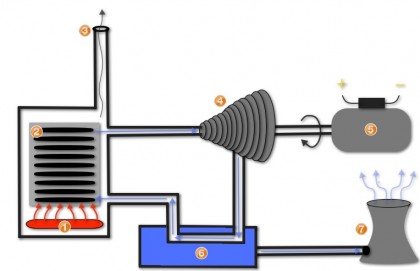How a Steam Turbine Works
A steam turbine generator works by heating water to extremely high temperatures until it is converted into steam, then the steam energy is used to rotate the blades of a turbine to create mechanical or rotational energy.
This rotational energy caused by the high pressured steam turbine is used to generate electricity from an attached generator.
This video fully explains the diagram below, or read the step-by-step tutorial on how a steam turbine works:
In the diagram below we see a simplified example of how a steam energy turbine works. Here is a simple step by step guide:
(1) A heat source of some sort — perhaps a combusted fossil fuel or solar heat — is used to create heat energy.
(2) The boiler, which contains water, uses the heat energy to convert the water into high pressure steam.
Moving on, from the diagram above you can see next step in the steam turbine process:
(3) If the system is using a combustible fossil fuel as a heat source, then an exhaust pipe is needed to release the pollutants. If the system uses solar energy for the heat conversion, then an exhaust pipe is not needed because the solar energy system will not release any pollutants.
(4) The steam from the water in the boiler is pumped into the steam turbine. The steam energy spins the turbine blades.
(5) The generator is attached to the steam turbine by a rotating shaft. As the steam turbine spins, the generator spins and creates electricity.
(6) The steam that uses it’s energy to spin the turbine passes through and is cooled using a cooling tower. The steam could alternatively be cooled naturally, perhaps using a lake or river,
(7) The cooling tower releases the already used, lower energy, and cooled steam into the atmosphere. The remaining water that is cooled back into a liquid state is pumped back into the boiler and repeats the process again, creating more energy from steam.
